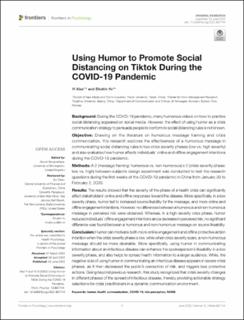| dc.contributor.author | Xiao, Yi | |
| dc.contributor.author | Yu, Shubin | |
| dc.date.accessioned | 2022-08-04T12:19:49Z | |
| dc.date.available | 2022-08-04T12:19:49Z | |
| dc.date.created | 2022-06-28T18:52:53Z | |
| dc.date.issued | 2022 | |
| dc.identifier.citation | Frontiers in psychology, 2022, Vol.13 | en_US |
| dc.identifier.issn | 1664-1078 | |
| dc.identifier.uri | https://hdl.handle.net/11250/3010167 | |
| dc.description.abstract | To combat the spread of the coronavirus, many village leaders in China and mayors in Italy used multiple media channels to communicate the importance of social distancing and remind citizens to stay at home. TikTok has become an emerging social media platform to communicate public health messages (Basch et al., 2020). For example, Chinese village leaders’ TikTok micro-videos and Italian mayors’ Facebook Live video clips about enforcing coronavirus quarantine rules became global viral hits. Some won unexpected celebrity status after furiously shouting at and scolding people who flouted quarantine laws in an aggressively humorous manner. Leaders revealed the most absurd stories and justifications used by citizens to explain their breaches of the rules, like playing ping-pong at the beach, pretending to go for a run, or calling hairdressers to their homes to have their hair done. For instance, a video about the mayor of Reggio Calabria told a virus-lockdown dodger that he is not a Will Smith character: “I saw a fellow citizen amiably jog up and down the street accompanied by a dog that was visibly worn out. I stopped and told him, look this is not a movie. You are not Will Smith in I Am Legend. Go home!” The mayor of Lucera raged at citizens calling hairdressers to their homes: “What is the damn point? Do you understand that coffins are closed? Who will see all these beautiful hairstyles in the coffins?” | en_US |
| dc.language.iso | eng | en_US |
| dc.publisher | Frontiers | en_US |
| dc.rights | Navngivelse 4.0 Internasjonal | * |
| dc.rights.uri | http://creativecommons.org/licenses/by/4.0/deed.no | * |
| dc.subject | humor | en_US |
| dc.subject | health communication | en_US |
| dc.subject | COVID-19 | en_US |
| dc.subject | risk perception | en_US |
| dc.subject | RAMS | en_US |
| dc.title | Using Humor to Promote Social Distancing on Tiktok During the COVID-19 Pandemic | en_US |
| dc.title.alternative | Using Humor to Promote Social Distancing on Tiktok During the COVID-19 Pandemic | en_US |
| dc.type | Peer reviewed | en_US |
| dc.type | Journal article | en_US |
| dc.description.version | publishedVersion | en_US |
| dc.rights.holder | The Authors | en_US |
| dc.source.journal | Frontiers in Psychology | en_US |
| dc.identifier.doi | 10.3389/fpsyg.2022.887744 | |
| dc.identifier.cristin | 2035908 | |
| cristin.ispublished | true | |
| cristin.fulltext | original | |
| cristin.qualitycode | 1 | |

